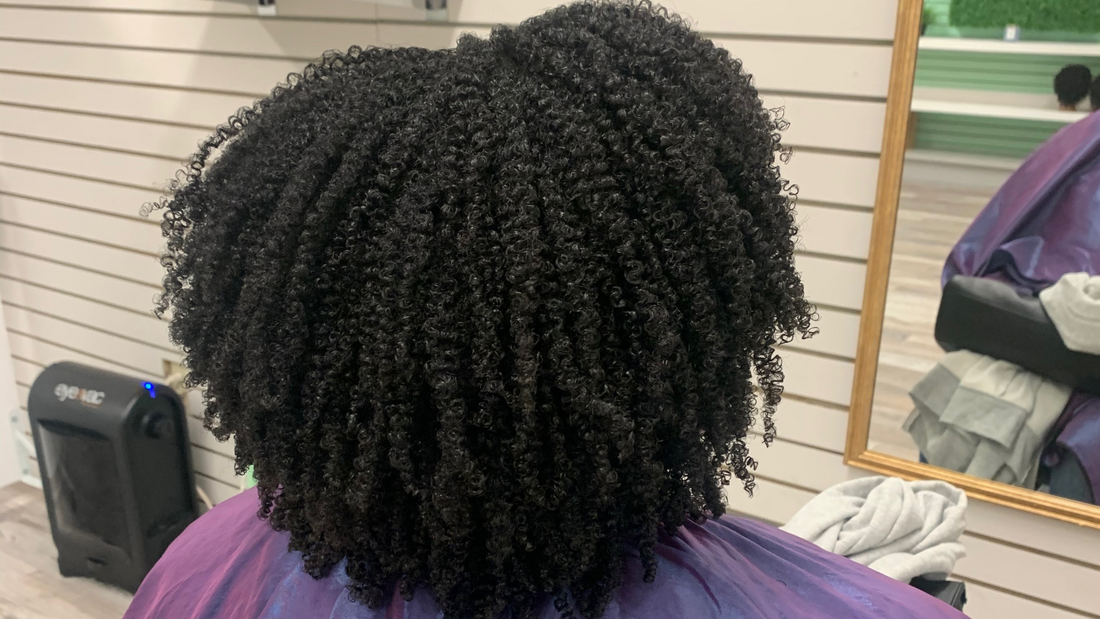If you live in an area that experiences significantly colder weather in the winter, you may be used to changing your hair care routine based on the season. We're here to tell you that drastic changes and purchasing seasonal products aren't entirely necessary. The frigid temperatures and dry air may affect your hair, and scalp if they aren't properly maintained throughout the winter months. There are ways to prevent excessive dryness and keep your curls looking healthy and hydrated all year long.
Keep your regimen consistent.
If you are using high-quality products and are washing your hair weekly, your hair should stay moisturized in between washes. You may need to increase the number of times you wash your hair in a week if you notice dry hair or an itchy scalp. A key component to your regimen is fully setting and drying your hair. Damp hair can cause hydral fatigue, which will eventually lead to weakened hair. in colder weather, damp hair is placed under even more stress. Drying your hair completely will help lock in your moisture and keep your locks healthy and happy.
Getting your hair routinely trimmed is still important in cooler weather. You want to set your hair up for success, and split ends will cause more hair breakage, inconsistent hair styling, and overall make your hair more difficult to efficiently and quickly cleanse and style.
Be mindful of the fabric you wear.
Certain materials will cling to your hair and lead to breakage. If you'd like to avoid said breakage, try putting your knit and wool sweaters on while your hair is still protected with a scarf, bonnet, or whatever you choose to wear to sleep. If your hair is longer and may touch the neckline of your wool sweaters or scarves, consider styling your hair so the contact is minimal. That can reduce the friction of you pulling the sweater or shirt over your head and onto your body. You can also style your hair in a way that it will not be constantly touching or getting caught onto your clothing. Simple buns can do wonders to avoid contact.
If you like to wear knitted hats or something similar frequently, you may want to invest in silk-lined or satin-lined accessories. Multiple Black-owned businesses sell these items. If you have sewing capabilities or know someone you can, you can make alterations to your favorite winter items for a significantly lower cost. You don't have to compromise your sense of style to protect your hair.
Common Myths:
There are so many myths that are recognized as fact within the natural hair community. Unfortunately, many of them misguide us and ultimately make our regimen more difficult. Here are a few of them.
Wearing protective styles is a MUST in winter.
Wearing protective styles ultimately makes it harder to cleanse and moisturize your hair. Many people believe if you keep the ends of your hair tucked away, they will be healthier in the long run. The truth is, the ends of your hair are the oldest and therefore, the most susceptible to damage even if your regimen is flawless. Trimming your split ends, using conditioner correctly, and keeping a consistent and frequent cleansing regimen will improve your hair in the long run.
Note: You can still rock your protective styles, but understand that you should wear them for 6 weeks max and give your hair rest in between. We recommend wearing loose, natural styles like wash-n-gos and two-strand twists.
You need to use oils and butters to keep your hair moisturized in the winter.
Oils and raw, heavy butters will make your hair water-repellent. This means that when you cleanse your hair, it will have a harder time absorbing water (if it absorbs it all), thus harder to cleanse. Your hair after washing will feel dry. Then you'll add more oils and butters to make it feel moisturized, but in reality, it's lubricating the outside of the hair. It doesn't penetrate the hair shaft and hydrate it the way that water does.
The winter means hair struggles.
You may have heard of or experienced more difficult hair during the colder seasons. Common problems associated with winter are dry, brittle hair and an irritated scalp. Many of us have been told that this is the nature of our tight curls and we just need to endure the issues or we need to use oil, grease, or butters to hydrate the hair. This isn't true. The only true way to hydrate your hair is with water. That happens during the cleansing process. The moisture is then locked with a conditioner. If you're cleansing your hair about every week or so, your hair can still thrive throughout winter.
You don't have to dread winter because you have tight curls.
Our goal is to help you simplify your relationship with your natural hair and remove the stigmas and fears surrounding it. Being weary of the winter is something we hope to dismantle. Wearing your natural hair in loose styles doesn't have to be strictly seasonal e The best thing you can do is gain a better understanding of how and why your curls behave the way they do. Once you have that knowledge, hair care becomes a lot less daunting. If you haven't already, check out our Natural Hair webinar. This is a free resource that will start debunking some common misconceptions about tight curls and give you a peek into our Clean and Simple Detox course.

